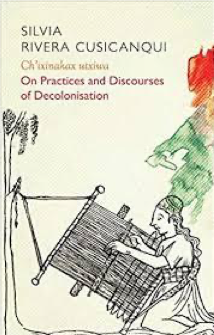
Silvia Rivera Cusicanqui
Ch’ixinakax utxiwa: A Reflection on the Practices and Discourses of Decolonization
South Atlantic Quarterly, 2012
95-109 pages
Reviewed by Jermani Ojeda Ludena
Silvia Rivera Cusicanqui, following the way of other Andean indigenous thinkers, reflects about colonization and decolonizing efforts and experiences in Ch’ixinakax utxiwa: A Reflection on the Practices and Discourses of Decolonization. The book invites the reader to know about the decolonization processes happening in the south of Abyayala (South America), a territory as the authors says, in “colonial conditions”. But at the same time, a territory with a history of permanent resistance of Aimara and Quechua indigenous people to colonization; as before and after the formation of modern state-nations in the former territory of Tawantinsuyu. The author contributes to the academic reflection in decolonizing theories from the South of the continent; in this case specifically relating to the experience of Bolivian indigenous people.
The resistance to colonialism has been manifested with different rebellions as the Tupaq Amaru and Tupaq Katari’s. They fought in order to modernize commercial networks in favor of indigenous people rejecting colonial periods’ taxation and continue until now with different manifestations as indigenous movements. This permanent struggling of indigenous people demonstrates their commitment to modernity but in their ways that are historically spiral but not linear as the Western, containing at the same time the past, future, and present. This spiral that contains different times is the present or aka or kunan pacha (in Aymara and Quechua) and means that the present is creating and emerging the future from the past while this past is bringing us to the renewal or Pachakuti. It reminds us the Incas’ emperor Pachakuteq who is the responsible of the renewal of the present. In this life conception we will return to the past as it was before Spaniards and its force will defeat conservative and archaic beliefs that represent and support the colonization against indigenous people.
Rivera Cusicanqui remarks that modern Andean state-nations need to be decolonized in many ways. As during Spaniards presence, current governments are continuing recycling colonizers’ practices of “exclusion and discrimination” against indigenous people. These practices are produced by elite dominant groups interested in maintaining the oppression against aboriginals. While imitating Western culture these dominant groups, in a country with majority of indigenous inhabitants, end up being just a caricature of foreign culture.
Rivera Cusicanqui criticizes academic practices. The studies of postcolonialism is present in contemporary academia, but it needs to change its relationship with “insurgent social forces” and grassroots organization that are struggling against colonization in countries like Bolivia. The practice in the academia is as the traditional colonizer one: stealing indigenous knowledge produced by scholars from South America.
In countries as Bolivia the colonization continues in many ways. For instance, a new wave of colonization is using the name of “multiculturalism” that essentializes and exoticizes indigenous people ignoring their permanent struggle against colonization in the neoliberal era. This multiculturalism implemented by governments just theatricalizes indigenous people softening the neoliberal adjustments that they are suffering. This current “culturalist agenda” is also inviting indigenous people as “minorities” to participate in the government while continuing with the power control by the traditional elites. The culturalist agenda of Bolivian elite is criticized in the book because there are some small reforms continuing with the power control by the same elite. This agenda puts indigenous people as savages belonging to the past and consequently denying their contemporaneity. This practice “obscures decolonization” struggles and enforces colonialism considering indigenous as subalterns and archaic people.
In countries as Bolivia were implemented many liberal reforms after the creation of the modern state-nation, but they did not have liberal practices in the economic and political sphere, instead the governor elite created an aristocratic group that in the practice was more colonizer than Spaniards before. This new criollo elite used and uses precapitalistic practices in favor of huge landowners (hacendados) and natural resources extractive companies. While oppressing Aymara and Quechua indigenous people who did not stop struggling against these policies and governments.
The book criticizes the Bolivian academia that is dependent of intellectual power centers located in the north of the continent. The local intelligentsia is repeating, and reproducing what intellectuals are doing in northern universities without a positionality as critics. Even when some scholars in the north are appropriating ideas from the south and presenting them as originals. The author denounces US’s decolonialism scholar Walter Mignolo who took her ideas about epistemology of oral history depoliticizing them. This is a usual practice of North American academia that traditionally did not interact or dialogue with academic production of the South. The North just provide scholarships to indigenous intellectuals to have support for their theoretical production exoticizing indigenous people according to their multiculturalism theory and practice. On the other hand, some South American universities, as the Ecuadorian Andina Simón Bolivar University, are permanently copying North American ideas using unnecessary neologisms.
Rivera Cusicanqui instead geopolitics of knowledge proposes political economy of knowledge because the former is not paying attention to the importance of analyzing material and economic strategies behind discourses and narratives. For example, many indigenous and mestizo scholars receive a material benefit and legitimize American academia. The author experienced as many indigenous scholars, the editor pressures to cite decolonial theorists of a North American university in order to publish her paper. Her response to that petition was that she uses indigenous people’s trajectory of their struggles against colonialism in Bolivia instead of just reading scholars from the US. Finally, the author reminds us that many concepts of colonialism were developed by Katarista movement and indigenous scholars as Fausto Reinaga before scholars in the United States of America, but as in colonial times those North American scholars are using indigenous knowledges showing them as their original production.

